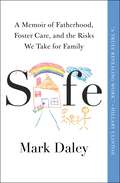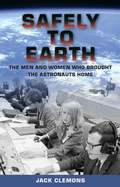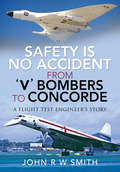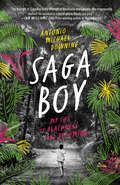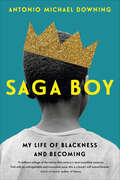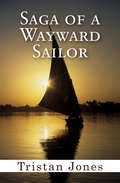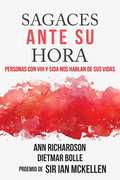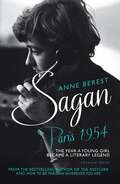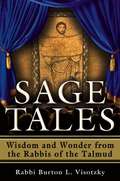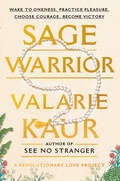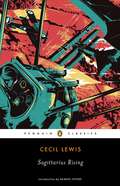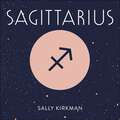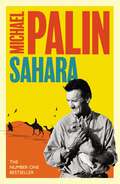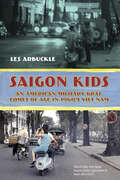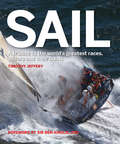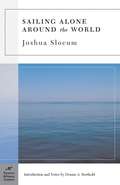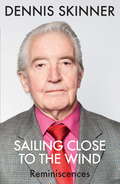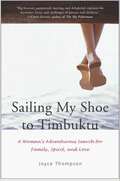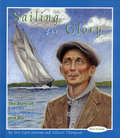- Table View
- List View
Safe: A Memoir of Fatherhood, Foster Care, and the Risks We Take for Family
by Mark DaleyA heartrending and unforgettable memoir of an unlikely journey to parenthood through America&’s broken foster care system.What does it take to keep a child safe? As a long-time strategist and activist fighting for better outcomes for foster children, Mark Daley thought he had the answer. But when Ethan and Logan, an adorable infant and a precocious toddler, entered into their lives, Mark and his husband Jason quickly realized they were not remotely prepared for the uncertainty and complication of foster parenting. Every day seven hundred children enter the foster care system in the United States, and thousands more live on the brink. Safe offers a deeply personal window into what happens when the universal longing for family crashes up against the unique madness and bureaucracy of a child protection system that often fails to consider the needs of the most vulnerable parties of all—the children themselves. Daley takes us on a roller coaster ride as he and Jason grapple with Ethan and Logan&’s potential reunification with their biological family, learn brutal lessons about sacrifice, acceptance, and healing, and face the honest, heartbreaking, and sometimes hilarious challenges of becoming a parent at the intersection of intergenerational trauma, inadequate social support, and systemic issues of prejudice. For fans of Nicole Chung&’s All You Can Ever Know, Stephanie Land&’s Maid, and Roxanna Asgarian&’s We Were Once a Family, this touching and suspenseful memoir highlights the impossible choices all parents, in the foster system and beyond, face in raising children today. Safe shines a much-needed spotlight on how this country treats the most vulnerable among us, sounding a vital call to overhaul a thoroughly broken system.
Safe: On Black British Men Reclaiming Space
by Derek Owusu'This is an inspiring collection of essays ... Every page of this book breaks down stereotypes of what being a Black man is.' Benjamin Zephaniah What is the experience of Black men in Britain? With continued conversation around British identity, racism and diversity, there is no better time to explore this question and give Black British men a platform to answer it. SAFE: On Black British Men Reclaiming Space is that platform. Including essays from top poets, writers, musicians, actors and journalists, this timely and accessible book brings together a selection of powerful reflections exploring the Black British male experience and what it really means to reclaim and hold space in the landscape of our society. Where do Black men belong in school, in the media, in their own families, in the conversation about mental health, in the LGBT community, in grime music - and how can these voices inspire, educate and add to the dialogue of diversity already taking place? Following on from discussions raised by The Good Immigrant and Why I'm No Longer Talking to White People About Race, this collection takes readers on a rich and varied path to confront and question the position of Black men in Britain today, and shines a light on the way forward.Read by Contributors: Alex Holmes, Alex Wheatle, Aniefiok 'Neef' Ekpoudom, Courttia Newland, Derek Oppong, Derek Owusu, Gbontwi Anyetei; Jesse Bernard, JJ Bola; Joseph Harker; Jude Yawson; Kenechukwu Obienu; Kobna Holdbrook-Smith; Nels Abbey; Okechukwu Nzelu; Robyn Travis; Stephen Morrison-Burke; Suli Breaks; Symeon Brown; Yomi Sode(p) Orion Publishing Group 2019
Safely to Earth: The Men and Women Who Brought the Astronauts Home
by Jack ClemonsIn this one-of-a-kind memoir, Jack Clemons—a former lead engineer in support of NASA—takes readers behind the scenes and into the inner workings of the Apollo and Space Shuttle programs during their most exciting years. Discover the people, the events, and the risks involved in one of the most important parts of space missions: bringing the astronauts back home to Earth. <p><p> Clemons joined Project Apollo in 1968, a young engineer inspired by science fiction and electrified by John F. Kennedy’s challenge to the nation to put a man on the moon. He describes his experiences supporting the NASA engineering team at what is now the Johnson Space Center in Houston, where he played a pivotal role in designing the reentry and landing procedures for Apollo astronauts and providing live support as part of the Mission Control Center’s backroom team. He went on to work on Skylab and the Space Shuttle Program, eventually assuming leadership for the entire integrated software system on board the Space Shuttle. <p><p> Through personal stories, Clemons introduces readers to many of the unsung heroes of the Apollo and Space Shuttle missions—the people who worked side by side with NASA engineers supporting reentry and landing for each Apollo mission and the software team who fashioned the computer programs that accompanied the crews on the Space Shuttle. Clemons worked closely with astronauts who relied on him and his fellow engineers for directions to their destination, guidance on how to get there, control of their fate during their journeys, and a safe return. He reveals problems, challenges, and near-disasters previously unknown to the public and offers candid opinions on the preventable failures that led to the loss of fourteen astronauts in the Challenger and Columbia tragedies. <p><p> Highlighting the staggering responsibility and the incredible technological challenges that Clemons and his colleagues took on in the race to reach the moon and explore the mysteries of space, this book is a fascinating insider’s view of some of the greatest adventures of the twentieth century.
Safer Than a Known Way
by Pamela Rosewell Moorelife story of Pamela Roswell Moore, companion to Corrie Ten Boom for the last years of her life
Safety is No Accident—From 'V' Bombers to Concorde: A Flight Test Engineer's Story
by John R. SmithA behind-the-scenes look at the aeronautical engineers who keep the skies safe. Many are surprised to learn that flying is, statistically, the safest means of transportation. Even less well known is the crucial role that flight test observers and engineers play in ensuring that level of safety. In this book, one of them recounts his experience as an aeronautical engineer working in partnership with test pilots, painting a vivid portrait of his flight-testing career from the 1960s to early 1980s at Avro and the UK&’s Civil Aviation Authority (CAA). During the author&’s time at Avro, he flew on the development and certification test flights of the Avro 748, 748MF, Shackletons, Nimrod, and Handley-Page Victor tanker. In the CAA, his role turned to regulation, making flight test assessments of manufacturer&’s prototypes and production aircraft, to check compliance with the CAA&’s flight safety requirements. The scope ranged from single-engine light aircraft to large civil transport aircraft. It involved frequent visits to foreign manufacturers and also included his participation in the CAA&’s Concorde certification flight test program. Advancements in the understanding of aerodynamics and an increasingly professional approach to risk management improved safety, but flight testing still involves risk, and several of the author&’s close friends and colleagues died in flight test accidents during this period. It is because of the courage and expertise of such people that millions of flights now touch down safely each year.
Saffron Barker Vs Real Life: My perfectly filtered life (Sort of. But not really at all)
by Saffron Barker#SaffronBarkerVSRealLifeIn a world of airbrushing and perfectly constructed social media lives, one girl is battling to make it through completely unfiltered (well, almost). Immerse yourself in Saffron Barker's wonderful, comical, and often challenging universe as she slays her teenage years with flair and enthusiasm (sometimes).Relationships! Confidence! Make-up fails! No tricky stone is left unturned as we follow Saffron over a year of her crazy life while she sets herself a series of goals, tries ever more elaborate ways to convince her brother to appear in a video, and tells the world she's coming to get it.
Saffron Barker Vs Real Life: My perfectly filtered life (Sort of. But not really at all)
by Saffron Barker#SaffronBarkerVSRealLifeIn world of airbrushing and perfectly constructed social media lives, one girl is battling to make it through completely unfiltered (well, almost). Immerse yourself in Saffron Barker's wonderful, comical, and often challenging universe as she slays her teenage years with flair and enthusiasm (sometimes).Relationships! Confidence! Make-up fails! No tricky stone is left unturned as we follow Saffron over a year of her crazy life while she sets herself a series of goals, tries ever more elaborate ways to convince her brother to appear in a video, and tells the world she's coming to get it.
Saffron Barker Vs Real Life: My perfectly filtered life (Sort of. But not really at all)
by Saffron BarkerYouTuber, social media star, and real life teenager Saffron Barker tells it like it is for people her age in this diary of her not so perfect life.#SaffronBarkerVSRealLifeIn a world of airbrushing and perfectly constructed social media lives, one girl is battling to make it through completely unfiltered (well, almost). Immerse yourself in Saffron Barker's wonderful, comical, and often challenging universe as she slays her teenage years with flair and enthusiasm (sometimes).Relationships! Confidence! Make-up fails! No tricky stone is left unturned as we follow Saffron over a year of her crazy life while she sets herself a series of goals, tries ever more elaborate ways to convince her brother to appear in a video, and tells the world she's coming to get it.(P)2017 Hodder & Stoughton Limited
Saga Boy: My Life of Blackness and Becoming
by Antonio Michael DowningThe triumph of Saga Boy is the triumph of Blackness everywhere--the irrepressible instinct for survival in a world where Blacks are prey."--Ian Williams, Giller Prize-winning author of ReproductionAn enthralling, deeply personal account of a young immigrant's search for belonging and black identity amid the long-lasting effects of cultural dislocation.Antonio Michael Downing's memoir of creativity and transformation is a startling mash-up of memories and mythology, told in gripping, lyrical prose. Raised by his indomitable grandmother in the lush rainforest of southern Trinidad, Downing, at age 11, is uprooted to Canada when she dies. But to a very unusual part of Canada: he and his older brother are sent to live with his stern, evangelical Aunt Joan, in Wabigoon, a tiny northern Ontario community where they are the only black children in the town. In this wilderness, he begins his journey as an immigrant minority, using music and performance to dramatically transform himself. At the heart of his odyssey is the longing for a home. He is re-united with his birth parents who he has known only through stories. But this proves disappointing: Al is a womanizing con man and drug addict, and Gloria, twice abandoned by Al, seems to regard her sons as cash machines. He tries to flee his messy family life by transforming into a series of extravagant musical personalities: "Mic Dainjah", a punk rock rapper, "Molasses", a soul music crooner and finally "John Orpheus", a gold chained, sequin- and leather-clad pop star. Yet, like his father and grandfather, he has become a "Saga Boy", a Trinidadian playboy, addicted to escapism, attention, and sex. When the inevitable crash happens, he finds himself in a cold, stone jail cell. He has become everything he was trying to escape and must finally face himself. Richly evocative, Saga Boy is a heart-wrenching but uplifting story of a lonely immigrant boy who overcomes adversity and abandonment to reclaim his black identity and embrace a rich heritage.
Saga Boy: My Life of Blackness and Becoming
by Antonio Michael DowningA Black immigrant journeys from the Caribbean to Canada—and through multiple musical personas—in a “deeply moving” memoir “suffused with poetic prose” (Publishers Weekly, starred review).As a clever, willful boy in a tiny village in the tropical forests of Trinidad—raised by his indomitable grandmother, Miss Excelly, and her King James Bible—Antonio Michael Downing is steeped in the legacies of his scattered family, the vibrant culture of the island, and the weight of its colonial history. But after Miss Excelly’s death, everything changes. The eleven-year-old seems to fall asleep in the jungle and wake up in a blizzard: he is sent to live with his devoutly evangelical Aunt Joan in rural Canada, where they are the only Black family in a landscape starkly devoid of the warm lushness of his childhood.Isolated and longing for home, Downing begins a decades-long journey to transform himself through music and performance. A reunion with his birth parents, whom he’s known only through story, closes more doors than it opens. Instead, Downing seeks refuge in increasingly extravagant musical personalities: “Mic Dainjah,” a boisterous punk rapper; “Molasses,” a soul crooner; and, finally, an eccentric dystopian-era pop star clad in leather and gold, “John Orpheus.” In his mid-thirties, increasingly addicted to escapism, attention, and sex, Downing realizes he has become a “Saga Boy”—a Trinidadian playboy archetype—like his father and grandfather before him. When his choices land him in a jail cell, Downing must face who he has become.“Lush language and sensory details make the fascinating events of this memoir pop. An authentic, entertaining, and timely account of a creative immigrant’s experiences.” —Booklist“Downing’s elegant, engaging memoir will have particular significance to readers from the Caribbean diaspora, but it will be understood by any reader who has ever had their world suddenly upended and needed to make it whole again.” —Library Journal“A rich memoir about how far some folks have to travel just to arrive where they began.” —Minneapolis Star Tribune
Saga of a Wayward Sailor
by Tristan JonesA &“unique and arresting&” memoir of seafaring adventures from the small boat sailor and author of Ice! and The Incredible Voyage (Motorboat & Yachting). Tristan Jones was one of the most acclaimed sea-faring storytellers ever. The combative Welshman was born at sea on a ship off Tristan da Cunha. He dropped out of school at 14 to work on sailing barges, and then spent the rest of his life at sea—-first in the Royal Navy, then as a delivery skipper, then as a daring adventurer. SAGA OF A WAYWARD SAILOR tells the tale of one of his most exciting adventures. Jones sails through treacherous waters aboard the Cresswell, a lifeboat converted into a sailboat, struggling to survive against impossible odds. He makes it through violent storms, arrest by the Soviet Navy, and other extraordinary experiences. Join Tristan Jones and a host of other lively and intriguing characters, as this salty and humorous tale unfolds.
Sagaces ante su hora: Personas con VIH y SIDA nos hablan de sus vidas
by Ann Richardson Dietmar BolleSon jóvenes y tienen una enfermedad letal. Es el año de 1991. Los diagnósticos por VIH van en aumento y no hay una cura a la vista. Procedentes de todos los rincones del mundo, cuarenta y un hombres y mujeres jóvenes nos hablan de vivir con VIH y SIDA. Tienen que sobrellevar el estigma, el reproche y la culpa asociados a la enfermedad. Se encuentran con desafíos al contarle a sus padres y parejas, en el intento de mantenerse sanos y cuando buscan trabajo, mientras se enfrentan con un futuro acortado. A pesar de ello, mantienen un compromiso de celebrar las alegrías de la vida tanto como puedan. Este libro es un testimonio de la resiliencia del espíritu humano. Publicado por primera vez en 1992, este libro cuenta sus historias únicas en sus propias palabras. “Esta colección de historias verdaderas es tan potente como cualquier gran clásico de ficción.” Sir Ian McKellen.
Sagan, Paris 1954
by Anne BerestFrom the bestselling author of The Postcard and How To Be Parisian Wherever You Are, this unique book charts Françoise's Sagan journey to publication for her legendary novel, Bonjour Tristesse.Before Françoise Sagan the literary icon, there was Françoise Quoirez, an eighteen-year-old Parisian girl, who wrote a novel and needed a publisher for it. This intimate narrative details the months in 1954 leading up to the publication of the legendary Bonjour Tristesse. We encounter Françoise, her family and friends close up, in a post-war world that is changing radically; and Mlle Quoirez, in her new guise of Françoise Sagan, will be at the heart of that social change. Sagan was always focused on her writing, though at times the fame of her books was to be eclipsed by her wild-child reputation. Yet, as Anne Berest herself testifies, Sagan's fearless approach to life lived on her own terms remains an inspiration even now.
Sage Tales: Wisdom and Wonder from Rabbis of the Talmud
by Burton L. VisotzkyGreat stories have the power to draw the heart. But certain stories have the power to draw the heart to God and awaken the better angels of our nature. Such are the tales of the rabbis of the Talmud, colorful, quirky yarns that tug at our heartstrings and test our values, ethics, morality-and our imaginations.
Sage Warrior: Wake to Oneness, Practice Pleasure, Choose Courage, Become Victory (The Revolutionary Love Project)
by Valarie KaurProfound inner wisdom for courageous action—from the author of See No Stranger and founder of the Revolutionary Love Project, a &“prophetic voice of our generation&” (America Ferrera)How do we find the wisdom to envision a new world and the courage to fight for it?How do we survive seemingly apocalyptic times?In a world on fire, how do we find love and joy?We are not the first to ask these questions—in fact, seeking answers to them forged one of the world's great wisdom traditions. In a time riven by caste, conquest, and cruelty, Sikhs blazed the path of the sant sipahi, the sage warrior. The sage radiates love and Oneness; the warrior activates that ethical power to fight for humanity. These energies empowered the first Sikhs to survive near-annihilation in South Asia nearly half a millennium ago. The sage warrior is the essential archetype for our time of turmoil—one we can all embody to cultivate our souls and transform the world.Valarie Kaur combines the epic, immersive story of her Sikh ancestors—centering the stories of the women who worked to map the path of the sage warrior—with the chronicle of a personal journey: her pilgrimage with her young children to the Panjab, India, where the stories unfolded, an occasionally comic adventure woven with sublime moments of connection and insight. Each chapter offers a lesson that emerges from the stories—from practicing pleasure to metabolizing grief to choosing courage.Sage Warrior shimmers with wisdom: Every story is accompanied by original artwork, music, and meditations, illuminating new ways of seeing and being. This journey is for anyone—from any faith tradition or spiritual practice or none at all—who hungers for a better world and is ready to discover the depth of their own power.
Sagittarius Rising
by Samuel Hynes Cecil LewisA memoir by a WWI fighter pilot, with the adventurous spirit of War Horse and the charm of The Little PrinceA singular, lyrical book, Sagittarius Rising is at once an exuberant memoir from the Lost Generation and a riveting tale of the early days of flight during World War I.<P><P> Cecil Lewis lied his way into the British Army's Royal Flying Corps at age sixteen and was ordered to a squadron on the Western Front only a year later. At the time, flying was so new that designers hadn't even decided on basic mechanics such as how many wings a plane should have. <P>Despite this, Lewis mastered virtually every kind of single-engine plane in the RFC, going on to excel in active duty and even to dogfight the Red Baron--and live to tell the tale. Full of infectious charm and written with the prose and pacing of a novel, Sagittarius Rising beautifully recounts Lewis's harrowing exploits in the sky alongside his wild times of partying and chasing girls while on leave in London. His coming-of-age story is unlike any other WWI memoir you've read before.
Sagittarius: The Art of Living Well and Finding Happiness According to Your Star Sign
by Sally KirkmanYou are a Sagittarius. You are the explorer and truth seeker of the zodiac.The signs of the zodiac can give us great insight into our day-to-day living as well as the many talents and qualities we possess. But in an increasingly unpredictable world, how can we make sense of them? And what do they mean? This insightful and introductory guide delves deep into your star sign, revealing unique traits and meanings which you didn't know. Along the way, you will discover how your sign defies your compatibility, how to improve your health and what your gifts are. ***The Pocket Astrology series will teach you how to live well and enhance every aspect of your life. From friendship to compatibility, careers to finance, you will discover new elements to your sign and learn about the ancient art of astrology. Other audiobooks in the series include: Aries, Taurus, Gemini, Cancer, Leo, Virgo, Libra, Scorpio, Sagittarius,Capricorn, Aquarius, Pisces(P)2018 Hodder & Stoughton Limited
Sahara
by Michael PalinMichael Palin's superb No. 1 bestseller about his incredible voyage across the Sahara.Michael Palin's epic voyages have seen him circumnavigate the globe, travel from the North to the South Pole and circle the countries of the Pacific Ocean, but this was perhaps the greatest challenge yet: to cross the vast and merciless Sahara desert. As the journey unfolds, the Sahara reveals not the emptiness of endless sand dunes, but a huge and diverse range of cultures and landscapes and a long history of commerce and conquest stretching from the time of the ancient Egyptians to the oil-rich Islamic republics of today. On his way, he encounters dangers such as camel stew, being run over by the Paris-Dakar rally and Dakar nightlife, as well as returning to the original spot where THE LIFE OF BRIAN was filmed.
Sahara
by Michael PalinMichael Palin's superb No. 1 bestseller about his incredible voyage across the Sahara.Michael Palin's epic voyages have seen him circumnavigate the globe, travel from the North to the South Pole and circle the countries of the Pacific Ocean, but this was perhaps the greatest challenge yet: to cross the vast and merciless Sahara desert. As the journey unfolds, the Sahara reveals not the emptiness of endless sand dunes, but a huge and diverse range of cultures and landscapes and a long history of commerce and conquest stretching from the time of the ancient Egyptians to the oil-rich Islamic republics of today. On his way, he encounters dangers such as camel stew, being run over by the Paris-Dakar rally and Dakar nightlife, as well as returning to the original spot where THE LIFE OF BRIAN was filmed.
Saigon Kids: An American Military Brat Comes of Age in 1960's Vietnam
by Les ArbuckleThis memoir of an American teenager coming of age in 1960s Vietnam “is a rip-roaring historical snapshot of a capitol teetering on the brink of war” (Rick Frederickson, Vietnam Magazine). In 1962, when US Navy Chief Petty Officer Bryant Arbuckle brought his wife and three sons to his new post in Southeast Asia, Saigon was a vibrant, dirty, exciting, and perilous metropolis filled with exotic temptations. Young Leslie Arbuckle was fourteen at the time. A fearless and inquisitive American boy, he was eager to explore the city’s forbidden wonders, from its bustling black market to its late-night brothels. The new world surrounding him was intoxicating, and he enthusiastically drank it all in. But Saigon in the mid-sixties was a lit powder keg about to explode, as an expanding war in the Vietnamese countryside began creeping closer. For Les, an exciting overseas lark would soon turn darker and more dangerous. Instead of running from angry street vendors, he found himself fleeing machine gun fire and witnessing the self-immolation of Buddhist monks protesting a corrupt political regime. As life went on within the confines of the US military compound, Les watched the city dissolve into chaos on the other side of the barbed wire. At once vivid, funny, beautiful, and frightening, Les Arbuckle’s Saigon Kids is an unforgettable evocation of a unique adolescence spent in a strange and volatile world—a remarkable memoir of growing up American on the edge of a war zone.
Sail: A Tribute to the World's Greatest Races, Sailors and Their Boats
by Timothy JefferyA celebration of sailing, featuring profiles on the world’s greatest races & sailors, as well as technical analysis of some of the best racing boats.Whether it is to test the high seas on around-the-world events in the glory of 49er yachts, to cut through choppy coastal waters on a Lazer racing for Olympic Gold or to set team against team in the great cup challenges, Sail is a celebration of the adventure and skill of one of mankind’s oldest sports.Including chapters on the greatest races and their class divisions and the incredible and inspirational stories of the world’s greatest sailors—from Ellen MacArthur to Seve Jarvin, Tony Bullimore to Vinny Lauwers—homage is paid to those who have mastered their boats and set out to conquer the seas.Sail also includes detailed technical analysis and intricate illustrations on each classification of racing boat, explained by the experts in their field, to give a complete account of the world of sailing competition.
Sailing Alone Around the World
by Joshua Slocum Dennis A. BertholdFull of astounding adventures, "Sailing Alone around the World " is the true story of the first man ever to circle the globe alone entirely by sea. In a little over three years, Captain Joshua Slocum completed the feat many experts believed couldn't be done--and he has the stories to prove it. During his historic voyage, Slocum was chased by pirates in Gibraltar, soaked by a "rain of blood" in Australia, and battered by perilous storms in the open ocean. He also met many famous--and infamous--people along the way, from Mrs. Robert Louis Stevenson in Samoa, to Black Pedro, "the worst murderer in Tierra del Fuego." This absorbing tale, written with humor and poetic eloquence, was first published in 1900 and has remained in print ever since.
Sailing Close to the Wind: Reminiscences
by Dennis Skinner Kevin MaguireDennis Skinner, the famed Beast of Bolsover, is adored by legions of supporters and respected as well as feared by admiring enemies. Fiery and forthright, with a prodigious recall, Skinner is one of the best-known politicians in Britain. He remains as passionate and committed to the causes he champions as on the first day he entered the House of Commons back in 1970. In an age of growing cynicism about politicians, the witty and astute Skinner is renowned as a brightly burning beacon of principle. He has watched Prime Ministers come and go - Heath, Wilson, Callaghan, Thatcher, Major, Blair, Brown - and yet remains uncorrupted by patronage and compromise. Cameron discovered Skinner's popularity when a public backlash forced the current PM to apologise in Parliament for calling Skinner a dinosaur who should be in a museum. Skinner at eighty has a unique take on post-war Britain. A combatant in the great social, industrial and political upheavals of the last half century, he's resisted telling his extraordinary story. Until now.
Sailing My Shoe to Timbuktu: A Woman's Adventurous Search for Family, Spirit, and Love
by Joyce ThompsonA mother finds spiritual grace while navigating divorce, new love, her fiftieth birthday, and her aging parents in this humorous & heartfelt memoir.“Bighearted, enormously moving, and delightful, captures the mysteries, loves, and challenges of parents and children.” —Craig Lesley, author of The Sky FishermanIn this fiercely candid and moving book, novelist Joyce Thompson recounts a difficult yet transforming period in her life. In words that will ring true to anyone in the “sandwich” generation, Thompson tells the story of her troubled marriage ending, her adjustment to single motherhood, finding new love, turning fifty, dealing with sick and dying parents, and somehow discovering a spiritual home in an ancient, earth-centered tradition.Along the way, she comes to terms with the blessings and specters of her own dysfunctional family. This includes her father, a distinguished judge and chronic alcoholic, and her tough, smart mother, a pioneering woman lawyer, who is slowly succumbing to Alzheimer's and whom Thompson helps to die gracefully, despite many traumatic and even ridiculous moments. But with Thompson’s lyrical, personal, and evocative writing, she transforms what could have been a soap opera into a rich, moving, and funny story, full of hope.“Thompson offers a stellar memoir many baby boomers can relate to: a career-oriented woman finds spiritual grace as she faces the squeeze of the “sandwich generation,” simultaneously caring for children and an aging parent. . . . A deeply satisfying story.” —Publishers Weekly“Thompson, author of Bones (1991), this time turns her talent and insight to nonfiction in a personal examination of a transformative time in her life.” —Booklist
Sailing for Glory: The Story of Captain Angus Walters and the Bluenose
by Teri-Lynn Janveau Allister ThompsonThis book tells the story of the unique bond between Captain Walters and his schooner the Bluenose. The ship is a Canadian icon and an icon of nautical competition, unbeaten between 1921 and 1939 in the races for the International Fishermans Cup. Its success galvanized a young nations national pride, and the ship remains an important symbol in Nova Scotia today. Walters skill and devotion to his ship helped the Bluenose hold off all challengers, even at the end of its illustrious career. Sailing for Glory also brings to life the danger and adventure of the life of a North Atlantic fisherman in the days of sail.
